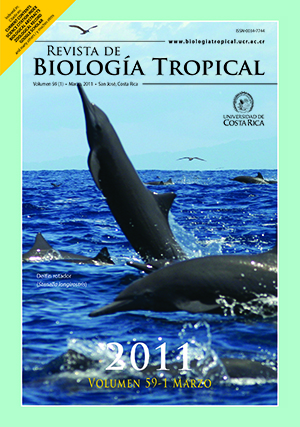Abstract
Several factors control the decomposition in terrestrial ecosystems such as humidity, temperature, quality of litter and microbial activity. We investigated the effects of rainfall and soil plowing prior to the establishment of Acacia mangium plantations, using the litterbag technique, during a six month period, in forests plantations in Bajo Cauca region, Colombia. The annual decomposition constants (k) of simple exponential model, oscillated between 1.24 and 1.80, meanwhile k1 y k2 decomposition constants of double exponential model were 0.88-1.81 and 0.58-7.01. At the end of the study, the mean residual dry matter (RDM) was 47% of the initial value for the three sites. We found a slow N, Ca and Mg release pattern from the A. mangium leaf litter, meanwhile, phosphorus (P) showed a dominant immobilization phase, suggesting its low availability in soils. Chemical leaf litter quality parameters (e.g. N and P concentrations, C/N, N/P ratios and phenols content) showed an important influence on decomposition rates. The results of this study indicated that rainfall plays an important role on the decomposition process, but not soil plowing.
##plugins.facebook.comentarios##

This work is licensed under a Creative Commons Attribution 4.0 International License.
Copyright (c) 2011 Revista de Biología Tropical


